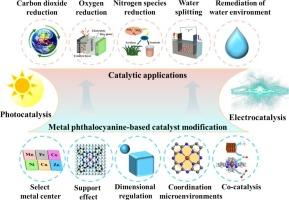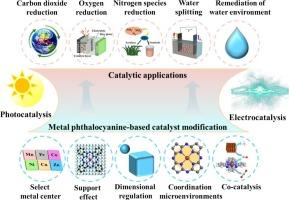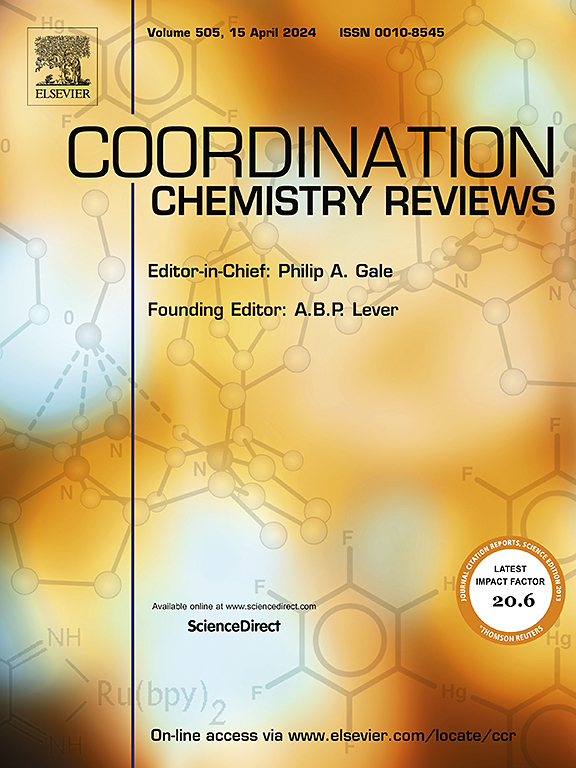Advances in the general design of high-performance metal phthalocyanine-based catalysts
IF 23.5
1区 化学
Q1 CHEMISTRY, INORGANIC & NUCLEAR
引用次数: 0
Abstract
The development of high-performance catalysts is critical for achieving a sustainable future. Metal phthalocyanines (MPcs), molecular catalysts with well-defined M–N4 coordination, exhibit unparalleled advantages in atomic precision, structural tunability, and compatibility with renewable energy-driven processes. Significant research efforts have been dedicated to enhancing the performance of MPc-based catalysts to meet the demands of diverse and complex reaction conditions. Therefore, in order to promote the development of MPc-based catalysts, a systematic and in-depth summary of the existing modification strategies is necessary. In this review, we systematically summarize and discuss the modulation mechanisms of MPc-based catalyst performance through selecting metal centers, support effects, dimensionality regulation, coordination microenvironment engineering, and co-catalysis, with a focused analysis on structure-performance relationships and the underlying theoretical principles. Subsequently, we outline the research progress of these modulation strategies in various reaction processes, including carbon dioxide reduction, oxygen reduction reaction, nitrogen species reduction, water splitting, and water environmental remediation. Finally, the future opportunities and challenges of MPc-based catalysts are discussed. This review will be of great significance for the design and application of efficient MPc-based catalysts.


高性能金属酞菁基催化剂总体设计研究进展
高性能催化剂的开发对于实现可持续的未来至关重要。金属酞菁(MPcs)是具有明确定义的M-N4配位的分子催化剂,在原子精度、结构可调节性和与可再生能源驱动过程的兼容性方面具有无与伦比的优势。为了满足多样化和复杂的反应条件的需要,人们对mpc基催化剂的性能进行了大量的研究。因此,为了促进mpc基催化剂的发展,有必要对现有的改性策略进行系统、深入的总结。本文从金属中心选择、支撑效应、维数调节、配位微环境工程、共催化等方面系统地总结和讨论了mpc催化剂性能的调节机理,重点分析了结构-性能关系及其理论原理。随后,我们概述了这些调控策略在各种反应过程中的研究进展,包括二氧化碳还原反应、氧还原反应、氮种还原反应、水分解和水环境修复。最后,讨论了mpc基催化剂未来的机遇和挑战。本文的研究对高效mpc基催化剂的设计和应用具有重要的指导意义。
本文章由计算机程序翻译,如有差异,请以英文原文为准。
求助全文
约1分钟内获得全文
求助全文
来源期刊

Coordination Chemistry Reviews
化学-无机化学与核化学
CiteScore
34.30
自引率
5.30%
发文量
457
审稿时长
54 days
期刊介绍:
Coordination Chemistry Reviews offers rapid publication of review articles on current and significant topics in coordination chemistry, encompassing organometallic, supramolecular, theoretical, and bioinorganic chemistry. It also covers catalysis, materials chemistry, and metal-organic frameworks from a coordination chemistry perspective. Reviews summarize recent developments or discuss specific techniques, welcoming contributions from both established and emerging researchers.
The journal releases special issues on timely subjects, including those featuring contributions from specific regions or conferences. Occasional full-length book articles are also featured. Additionally, special volumes cover annual reviews of main group chemistry, transition metal group chemistry, and organometallic chemistry. These comprehensive reviews are vital resources for those engaged in coordination chemistry, further establishing Coordination Chemistry Reviews as a hub for insightful surveys in inorganic and physical inorganic chemistry.
 求助内容:
求助内容: 应助结果提醒方式:
应助结果提醒方式:


